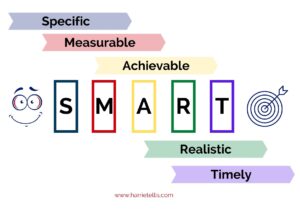Studying and working at the same time can be challenging for many and it is important to acknowledge that you might feel stressed or anxious at times. Especially when you are getting closer to your exams, the pressure increases and can be overwhelming for some. We want to share some useful tips on how to manage your learning and deal with stress.
3 Top Tips for Better Learning:
1. Setting SMART goals:
This is a well-known method used in coaching, management, and leadership training.
The letters SMART refer to:
S = Specific: To avoid feeling overwhelmed with the amount of study content, set yourself daily learning tasks or topics. Be very specific, which section you want to study in the selected day or time.
M = Measurable: Once you have selected your topic, be specific with the exact number within the task you want to achieve. This could be, “Reading 20 pages in a new chapter”.
 A = Achievable: It is important, to set your specific, measurable task at a level you know you can achieve. Therefore, be as realistic as possible so your mind can learn to work with the success of achieving your goals. If you know, you only have 2 hours available on a specific day to do some reading, don’t aim for 200 pages but a number you can achieve in the given time.
A = Achievable: It is important, to set your specific, measurable task at a level you know you can achieve. Therefore, be as realistic as possible so your mind can learn to work with the success of achieving your goals. If you know, you only have 2 hours available on a specific day to do some reading, don’t aim for 200 pages but a number you can achieve in the given time.
R = Realistic: Be realistic with your goals and only aim for a level, you know you can achieve. This way you feel less pressure on yourself and will find it easier to succeed. Similar to being achievable, aim for a task or goal you can manage. “I will read through 10 pages in my course book today and will set myself 2 hours for it, allowing me time to also make notes.”
T = Timely: The more specific your goal, the more likely are you going to achieve it successfully and learn to get into a good routine and learning commitment.
Here is a good example of an unspecific goal setting: “This week I should really do some reading.” As you can see, this goal is very unspecific, and you will most likely find yourself busy doing everything but reading in your study books. Here is an example of a SMART study goal.
How does this sound instead? “This week I will allocate 1 hour of study time at 7pm on Monday, Wednesday, and Friday, to read 10 pages of the new chapter each time”.
2. Take regular learning or study breaks:
 We all have different ways to study or process and memorise information but taking breaks should be part of everyone’s learning routine. Breaks are not only recommended when you work but also when you are studying. Taking regular breaks can help reduce stress and allow our brain to recharge.
We all have different ways to study or process and memorise information but taking breaks should be part of everyone’s learning routine. Breaks are not only recommended when you work but also when you are studying. Taking regular breaks can help reduce stress and allow our brain to recharge.
If you spend long hours looking at a screen, make sure you step away from it during your break. Take a moment and enjoy a coffee or go for a nice walk to get some fresh air. You might find that you can focus better on your work when you return.
3. Ask for help:
 This is very important and absolutely ok to do, not only whenever you feel down or demotivated or when you feel overwhelmed and stuck with your learning. It is also important to reach out and share achievements or successes in your learning process. Help can be provided in many ways, whichever works for you, and can be a close friend, joining you for a walk, to help you clear your mind, or spend some time with you revising what you have learned. It can also be a colleague at work, helping you improve on a new task or reaching out to your tutor when you have questions about your course or exam preparation.
This is very important and absolutely ok to do, not only whenever you feel down or demotivated or when you feel overwhelmed and stuck with your learning. It is also important to reach out and share achievements or successes in your learning process. Help can be provided in many ways, whichever works for you, and can be a close friend, joining you for a walk, to help you clear your mind, or spend some time with you revising what you have learned. It can also be a colleague at work, helping you improve on a new task or reaching out to your tutor when you have questions about your course or exam preparation.
We hope you find these tips useful to assist you with your learning as well as reducing any learning- or study-related stress. If you like, let us know how you get on with your SMART goal setting. We would also love to hear your personal top tips on how you arrange your learning and working time.
















